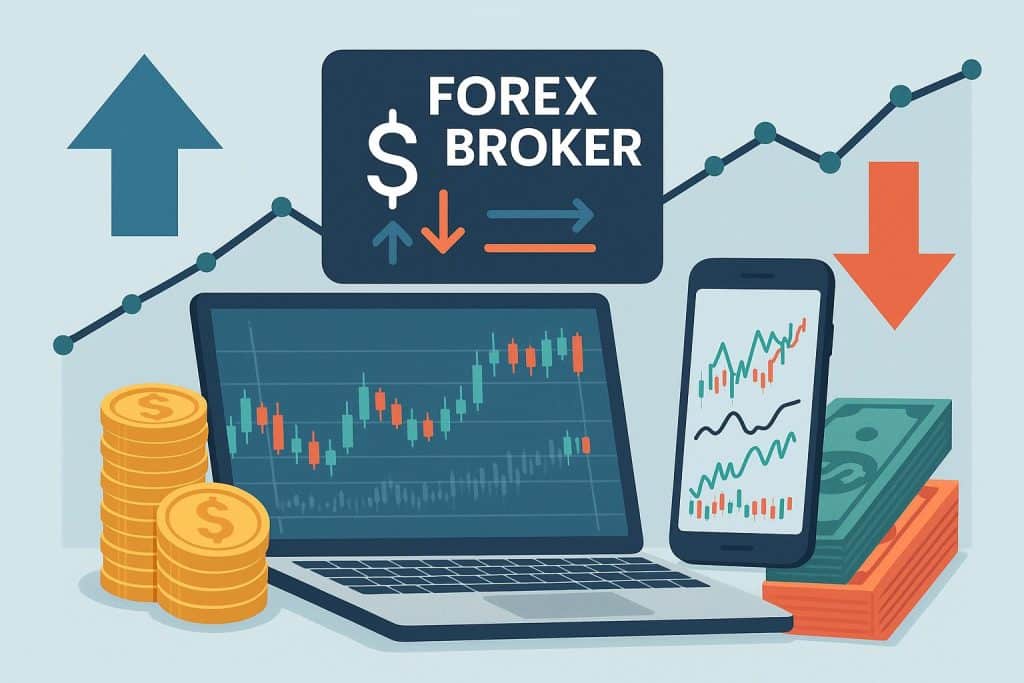The foreign exchange market is the largest and most liquid financial market in the world. Millions of individual traders and institutional participants buy and sell currencies around the clock. However, to access this global market, individual traders rely on the services of an online forex broker.
Understanding how an online forex broker works can help traders choose a provider that matches their needs and supports their trading goals. This article explains the role of such brokers, how they operate, and what traders should know before opening an account.
What Is an Online Forex Broker?
An online forex broker acts as an intermediary between individual traders and the interbank currency market. The interbank market consists of a network of banks and financial institutions that exchange currencies directly with one another. Retail traders generally do not have the resources or infrastructure to access this market on their own.
An online forex broker bridges this gap by providing a trading platform where clients can buy and sell currency pairs. The broker handles the technical, legal, and operational aspects of trade execution, allowing traders to focus on their strategies.
Core Functions of an Online Forex Broker
An online forex broker performs several key functions:
1. Market Access
The broker connects clients to the wider forex market, either through its own liquidity pools or by linking orders to external liquidity providers. Without this access, individual traders would not be able to execute currency trades.
2. Trading Platform
Brokers provide electronic trading platforms that display real-time price quotes, allow for order execution, and offer analytical tools. These platforms can be desktop-based, web-based, or mobile-friendly.
3. Account Services
The broker manages client accounts, including deposits, withdrawals, and record-keeping. Traders can monitor their account balances, margin levels, and open positions through the broker’s platform.
4. Leverage and Margin
Most brokers offer leverage, which allows clients to control larger positions with a relatively small deposit. While leverage can increase potential returns, it also magnifies risk.
5. Risk Management Tools
Brokers integrate risk management features into their platforms, such as stop-loss and take-profit orders. These tools help traders control potential losses and secure profits.
6. Market Research and Education
Many brokers provide market news, economic calendars, and trading insights. Some also offer educational content to help traders build knowledge and improve their strategies.
How Trade Execution Works
When a trader places an order through the broker’s platform, the broker transmits that order to the market for execution. The process can vary depending on the broker’s business model:
- Market Maker: The broker acts as the counterparty to the client’s trade, setting its own bid and ask prices. This model allows for fast execution but can result in conflicts of interest.
- Straight Through Processing (STP): The broker routes client orders directly to external liquidity providers without intervention. Execution quality depends on the depth of liquidity.
- Electronic Communication Network (ECN): The broker connects traders to a network of liquidity providers and other market participants. This model typically offers tight spreads and high transparency.
Each model has advantages and disadvantages. It is important for traders to understand how their broker executes trades and how this affects pricing and execution quality.
How Brokers Earn Revenue
An online forex broker typically generates revenue through several channels:
- Spreads: The difference between the bid and ask price of a currency pair. The spread represents a cost to the trader and a source of income for the broker.
- Commissions: Some brokers charge a commission per trade, particularly when offering very tight spreads.
- Swap Fees: Also known as rollover fees, these are charged for holding positions overnight, based on the interest rate differential between the two currencies.
Understanding the broker’s fee structure is essential for evaluating overall trading costs.
Regulation and Security
Reputable brokers operate under the supervision of regulatory authorities, which impose rules to protect client funds and promote transparency. Before opening an account, traders should verify that the broker is properly licensed.
Segregated client accounts, transparent pricing, and clear dispute resolution procedures are all signs of a trustworthy broker.
Choosing the Right Broker
Selecting the right online forex broker depends on several factors:
- Regulatory status and reputation
- Trading costs, including spreads and commissions
- Execution quality and speed
- Quality and usability of the trading platform
- Availability of customer support
- Educational and analytical resources
Regional factors may also influence broker selection. For example, traders based in South Africa often research best forex brokers in South Africa to find brokers that offer local support, suitable account options, and regulatory compliance with South African financial authorities.
Conclusion
An online forex broker plays a central role in facilitating currency trading for individual traders. By providing market access, platforms, leverage, and risk management tools, brokers make it possible to trade currencies efficiently.
Understanding how brokers operate and evaluating their services carefully helps traders make informed choices and manage risk effectively. For those seeking reliable options, reviewing comparisons of the best forex brokers in south africa or other relevant regions is a practical first step.
